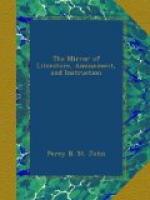RUGBY SCHOOL
[Illustration: Rugby School.]
On the eastern border of Warwickshire, about 13 miles from Coventry, and 16 from Warwick, stands the cheerful town of Rugby, a place of great antiquity, but of little note previous to the erection of a grammar-school there, towards the close of the sixteenth century. The circumstances under which this school was founded, and the rank it has attained among our classical seminaries, may probably be interesting to the reader.
Rugby School was founded in the ninth year of Elizabeth, by Lawrence Sheriff, grocer, of London, chiefly as a free grammar-school for the children of the parishes of Rugby and Brownsover, and places adjacent. For the accommodation of the master, who was, “if it conveniently might be, to be ever a Master of Arts,” he bequeathed a messuage at Rugby, in which it is probable he had himself resided during the last few years of his life, and he directed that there should be built, near this residence, a fair and convenient school-house, to defray which expense, and of a contiguous almshouse, he bequeathed the revenue of the rectory of Brownsover, and a third portion of twenty-four acres of land, situate in Lamb’s Conduit Fields, “near London,” and termed the Conduit Close. These eight acres were of trivial value at the period; and in 1653, the trustees of the property paid the schoolmaster a salary of 12_l_. a year, and each of the alms-men 7_s_. 7_d_. In 1686, the Lamb’s Conduit property was leased for fifty years at 50_l_. per annum. The metropolis increased, and stretching one of its Briareusian arms in this direction, the once neglected field rose in value, and in 1702 (thirty-four years before the expiration of the above term) the trustees granted a fresh lease to William (afterwards Sir William) Milman, of forty-three years, to commence at the termination of the former lease. Building was not then a mania, and Sir William obtained his term for 60_l_. per annum; so that until the year 1780, the annual produce of the estate belonging to the Rugby charity, was only 116_l_. 17_s_. 6_d_.! But, shortly after the grant of an extended term to Sir W. Milman, handsome streets of family houses sprung up, and it was computed that a ground-rent of at least 1,600_l_. would accrue to the charity on the expiration of his lease. A much greater income has, in fact, arisen, and the revenues will be materially increased on the termination of the present leases.
The flourishing finances of this noble institution are well managed by twelve trustees, chosen from the nobility and gentry of the country.[1]




